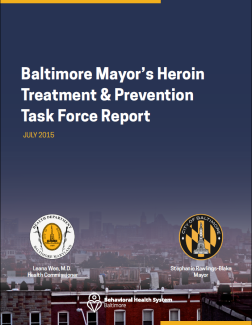Baltimore Mayor’s Heroin Treatment & Prevention Task Force Report

EXECUTIVE SUMMARY
In October 2014, Mayor Stephanie Rawlings-Blake convened the Heroin Treatment and Prevention Task Force to address the critical problem of opioid addiction in Baltimore City. The goal of the Task Force was to study the problem of heroin addiction and to propose solutions for improving access to effective treatment and neighborhood compatibility. The Task Force engaged many key stakeholders and partners throughout this process to study the best practices available to address this critical issue.
The work of the Task Force was divided into four workgroups: Data, Access to Care, Practice Standards, and Neighborhoods. The workgroups were comprised of national and local experts, community stakeholders, providers, and representatives from state and local government. Each engaged in a process to review the relevant literature, gather information about the existing systems, review national models, and develop recommendations to address the unique needs of Baltimore City.
The Mayor and Health Commissioner also convened community meetings to solicit feedback from interested community members. The ten recommendations contained in this report represent the culmination of this work, along with input from a broad spectrum of stakeholders and community members.
These recommendations will help guide the work of the Baltimore City Health Department and Behavioral Health System Baltimore in addressing the issue of heroin and opioid misuse and overdose over the next several months and years. We hope these action items can also spur action for state and federal partners to assist Baltimore with recovery and healing, and building our city into a model for others to follow.
